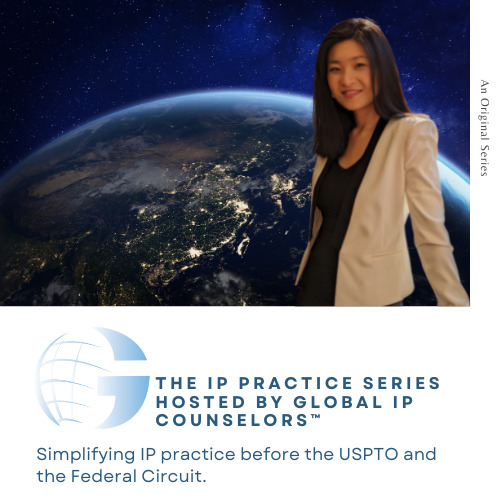Recent Episodes
While it may not be common to receive a prior art rejection for a design patent, it certainly can happen, especially if the design is broadly claimed. In utility patents, the issue of obviousness is an analysis of what a person having ordinary skill in the art would find to be obvious in light of the same or similar problem. When it comes to design patents, obviousness rests on the “ordinary observer” test, which is an analysis of the claimed design and its prior art seen as a whole instead of comparing the claimed design to the prior art design element by element. While the ordinary observer test requires a consideration of the design as a whole in the context of its environment features, the claim scope remains very important in terms of how the design will be examined.
A means-plus-function limitation is a functional limitation that claims function without structure. The claimed element presented for prosecution is pure function and not structure. This type of claiming is used often with software patents, which recite function via a series of computer implemented steps to carry out a means.
In the United States, patent prosecution practice is primarily shaped by two governing bodies: 1) the U.S. Patent and Trademark Office (USPTO), which issues procedural practice guidelines, and 2) judicial rulings from the U.S. Court of Appeals for the Federal Circuit. When it comes to the matter of Section 101 subject matter eligibility, the USPTO and the Federal Circuit diverge somewhat in their analysis, specifically in their consideration of what constitutes an “abstract idea.” Our modern-day concept of “abstract idea” is shaped by the Supreme Court’s ruling in Alice v. CLS Bank in 2014. The USPTO and the Federal Circuit both operate under the Alice doctrine of “abstract idea” when it comes to assessing subject matter eligibility, particularly when it comes to software patents. Alice requires that an “abstract idea” has “something more” than what is well-understood, routine and conventional in order to be patent eligible.
Proffered by Senator Thom Tillis (R-NC) in the interest of expediting patent prosecution for those applications that receive Section 101 rejections, under the new Deferred Subject Matter Eligibility (DSMER) program, eligible applicants who receive a subject matter eligibility rejection with prior art rejection(s) or indefiniteness rejection(s) can defer substantively responding to the Section 101 rejection until all other rejections have been withdrawn. This program began on February 1 and will last until July 30 of this year. The U.S. Patent and Trademark Office (USPTO) will notify eligible applicants in the first Office Action on the merits. The applicant can then choose to participate in the program by filling out a form paragraph.
About This Podcast
Global IP Counselors is dedicated to protecting the intellectual property rights of applicants around the world. We believe in drafting disclosures that are enabled to support a broad range of claim scopes at the onset of prosecution, placing the applicants’ claims strongly in position for future assertion. In order to provide world class IP service, we maintain a full understanding of the ongoing changes to the USPTO’s agency guidelines as well as precedential rulings from the US courts. Join Wen Xie at the IP Practice Vlogs as she discusses the newest IP practice insights before the USPTO and the Federal Circuit.

Latest IPW Posts
Thoughts on the USPTO’s NPRM: Not Bad But the Big Challenges Remain
April 18, 2024 @ 05:30 pmUSPTO Publishes Long-Awaited Proposed Rule on PTAB Changes
April 18, 2024 @ 04:30 pmStay on Top of Hot Topics in Patent Damages Litigation
April 18, 2024 @ 01:15 pmFTC Sets Meeting to Vote on Final Noncompete Rule
April 17, 2024 @ 04:30 pm

![[IPWatchdog Logo]](https://ipwatchdog.com/wp-content/themes/IPWatchdog%20-%202023/assets/images/temp/logo-small@2x.png)

![[Advertisement]](https://ipwatchdog.com/wp-content/uploads/2024/04/Patent-Litigation-Masters-2024-sidebar-early-bird-ends-Apr-21-last-chance-700x500-1.jpg)
![[Advertisement]](https://ipwatchdog.com/wp-content/uploads/2021/12/WEBINAR-336-x-280-px.png)
![[Advertisement]](https://ipwatchdog.com/wp-content/uploads/2021/12/2021-Patent-Practice-on-Demand-recorded-Feb-2021-336-x-280.jpg)
![[Advertisement]](https://ipwatchdog.com/wp-content/uploads/2021/12/Ad-4-The-Invent-Patent-System™.png)
